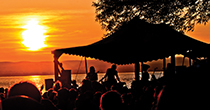The Voice of the Poet
by Donald Sutherland

Henry Beissel was born in Cologne, Germany, in 1929. As a boy in WW2, he witnessed the relentless bombing and destruction of much of his beautiful city. He emerged from the rubble to become a poet, author, playwright, and Professor of English at Concordia University in Montreal. In Humanist Perspectives, Issue 183, Winter 2012–13, he had this to say about a poet’s voice: “Today, when commercialization is poisoning the space in which the arts can flourish, poetry also has a political function to be the conscience of our tribe by bearing witness in truth to the corruption of civil society and challenging our humanity to come into its own.”
Our culture is awash in relentless noise, all too successful in turning us into ravenous consumers of professional sports, big box store specials, and celebrity weddings and scandals. Our attention span is usually too short to partake of “slow paced” activities such as meditation, self-examination, yoga, or dare I say, poetry. Yes, poetry.
For the past two years, I have been captivated by the singing of Idrissa Turay at the Forks in Winnipeg, Manitoba. He agreed to an interview. I will share a summary of Idrissa’s rich background. He was born in Sierra Leone, West Africa, into a family of ten children. He was the only son. His father had four wives. The youngest was his mother with whom he still has a close relationship. Some years were spent as a refugee in Guinea. The Revolutionary United Front (RUF) took possession of the diamond mines and used the proceeds to finance a brutal ten-year civil war which resulted in approximately 120,000 deaths and two million people displaced before it finally ended in 2,000. The RUF made widespread use of limb amputation, rape, and child soldiers to terrorize, butcher, and maim.
With the sponsorship of a niece, Idrissa arrived in Winnipeg in 2001 and took a day job in a jean factory and a night janitor job. On weekends, he began to play guitar and sing in a band. He now has his own band called Idrissa and the Peace Makers. Five years ago he began singing at the Forks, which he combines with driving a school bus. I asked him to talk about why he puts such energy into his craft.
“I am always writing songs. Once I get it, I put it on paper. Mostly, I compose love songs. I sing about crises, wars, and love. Singing means everything to me. Here is my soul. Music is central to my life. It’s like therapy for me. The way people respond to my music and poetry in the form of songs fills my days with joy. My wife, Tracy, is my editor, my support, my guide, my intimate. She is the brains in our relationship. All I know is poetry, singing, and music. Both my wife and I live frugally so we can help my mother in Sierra Leone, where she does all she can to help poverty stricken children go to school.”
Reprinted courtesy of Earthcare Connections, PO Box 1790, Wynyard, SK S0A 4T0. Phone (306) 554-LAND, email: info@earthcare.ca, www.earthcare.ca. Donald Sutherland is a conflict resolution consultant and career counsellor living in Winnipeg, Manitoba. |
